From ‘Ugly American’ to ‘Ugly Chinese’?


Are mainland Chinese the world’s worst travelers? Recent reports of the insufferable behavior of Chinese flight passengers would suggest as much. And if you haven’t heard the stories, they’re almost unbelievable.
Highlights include a family who had their child empty his bowels in the aisle of an international flight, only to be handily outdone by parents who made their child defecate directly into the seat, then the in-flight brawl sparked by a restive child, the man who opened the emergency door to get some fresh air, as you do, and the woman who threw boiling water into a flight attendant’s face and said she would kill herself while her husband threatened to blow up the plane because they didn’t like their seats.
Part of the problem is precisely that these stories are so appalling. Their vividness makes them readily come to mind when we think of Chinese passengers or even simply when we think of Chinese. We then use such cases when forming judgments about these vastly larger groups, an example of what Tversky and Kahneman called the availability heuristic, and a step toward prejudice. So we must ask ourselves, are these truly fair representations of Chinese behavior?
The most common explanation I’ve heard is that there are almost 1.4 billion Chinese, therefore such incidents are statistically to be expected. But this is a poor argument. For one thing, if it’s merely a numbers game then we should expect to find four times as many incidents among the world’s 81 percent non-Chinese. For another, the numbers game doesn’t work so well when you only look at air travel because not that many Chinese can afford the cost of a plane ticket. Indeed, according to the International Labor Organization, in 2012 the average annual salary in China was less than $5,000.
Another explanation is that every country has its share of rude people, as if there’s nothing particularly Chinese about any of this. But there is. China’s isolationism didn’t end until the 1978 reforms and not until 1997 could Chinese travel beyond Hong Kong, Macau, and select parts of southeast Asia. Therefore, some of these individuals, like the man who wanted fresh air, have never seen the inside of a plane and are innocent of airline protocol.
As for open defecation and urination, well, that’s Chinese too. Mainlanders potty train their kids using open-crotch pants that allow them to freely relieve themselves in public. Parents condition their children by making a gentle hushing sound when they go, until eventually they only go when their parents make this sound. It’s a clever solution that teaches continence at a young age and is also more hygienic than diapers, which are not only dirty and costly but can cause severe dermatitis. Problem is, the practice isn’t conducive to urban settings and has subsequently led to instances of shameful conduct (here, here, here, here and here).
Then there are the abusive or violent cases. To be sure, there’s nothing uniquely Chinese about aggression. In fact, China has one of the world’s lowest homicide rates. But whether it’s a product of Little Emperor Syndromeor something else entirely, many Chinese travelers have no respect for local customs and confuse dissatisfaction or inconvenience with moral outrage. And therein lies the problem. It’s not simply stinking up the cabin or complaining about seats, but the arrogance with which it’s done.
So, what then? China is hardly going to return to isolationism and with its greater openness and improving economy there will be many more first-time fliers or travelers whose customs we may not find agreeable. The International Air Transport Association projects the number of global passengers will increase from 2012 to 2017 by 31 percent and the greatest factor in this will be China, providing almost a quarter of the world’s new passengers. Airline staff will doubtless have their hands full. But the individuals concerned have been fined, publicly shamed, and the Chinese government is even considering banning them from flying, a measure well beyond what most Americans would consider fair.
In other words, the reaction by the government and the national dialogue reflect a position both sensible and intelligent. There are problems in Chinese society, but they are working on them. They hardly need Westerners leering over each new story. Maybe we do because we enjoy disparaging the nouveau riche. Europe looked down its nose at the American upstarts and now the West looks down its nose at China. And maybe that’s why, despite a sense of disgust, it is worth making an effort to look through the conceit concerning the ugly Chinese – after all, it is not that long ago that we were hearing about the ugly Americans.

No comments:
Post a Comment
Comments always welcome!